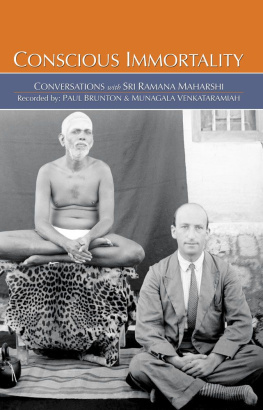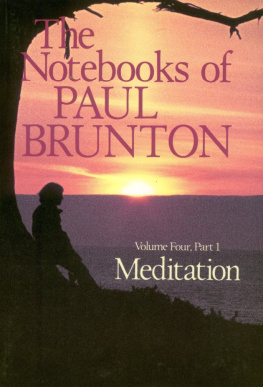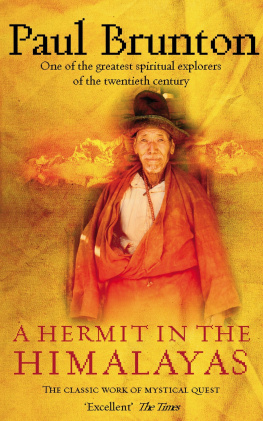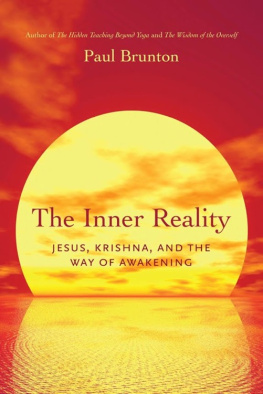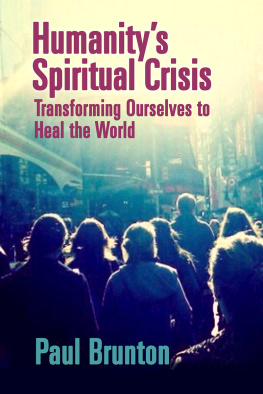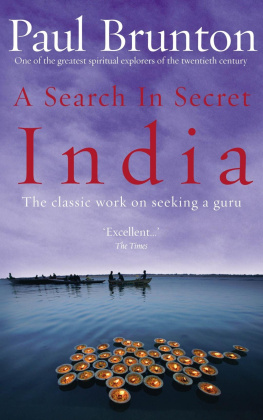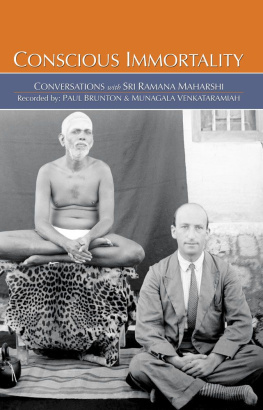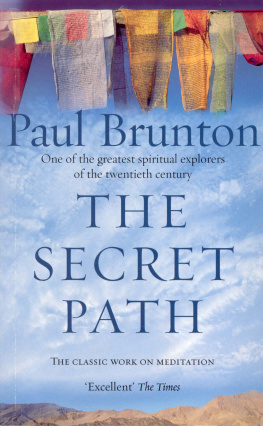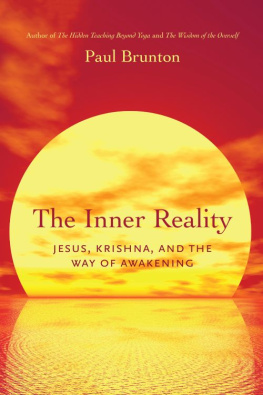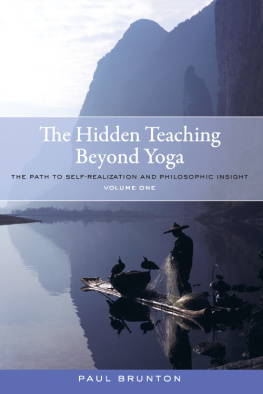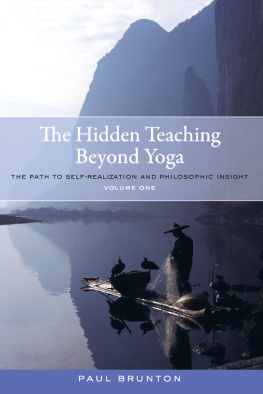Paul Brunton - Conscious Immortality
Here you can read online Paul Brunton - Conscious Immortality full text of the book (entire story) in english for free. Download pdf and epub, get meaning, cover and reviews about this ebook. year: 2013, publisher: Sri Ramanasramam, genre: Religion. Description of the work, (preface) as well as reviews are available. Best literature library LitArk.com created for fans of good reading and offers a wide selection of genres:
Romance novel
Science fiction
Adventure
Detective
Science
History
Home and family
Prose
Art
Politics
Computer
Non-fiction
Religion
Business
Children
Humor
Choose a favorite category and find really read worthwhile books. Enjoy immersion in the world of imagination, feel the emotions of the characters or learn something new for yourself, make an fascinating discovery.
- Book:Conscious Immortality
- Author:
- Publisher:Sri Ramanasramam
- Genre:
- Year:2013
- Rating:5 / 5
- Favourites:Add to favourites
- Your mark:
- 100
- 1
- 2
- 3
- 4
- 5
Conscious Immortality: summary, description and annotation
We offer to read an annotation, description, summary or preface (depends on what the author of the book "Conscious Immortality" wrote himself). If you haven't found the necessary information about the book — write in the comments, we will try to find it.
Conscious Immortality — read online for free the complete book (whole text) full work
Below is the text of the book, divided by pages. System saving the place of the last page read, allows you to conveniently read the book "Conscious Immortality" online for free, without having to search again every time where you left off. Put a bookmark, and you can go to the page where you finished reading at any time.
Font size:
Interval:
Bookmark:
C ONSCIOUS I MMORTALITY
C ONVERSATIONS with S RI R AMANA M AHARSHI
Recorded by: P AUL B RUNTON & M UNAGALA V ENKATARAMIAH

Sri Ramanasramam
Tiruvannamalai
INDIA
Contents
P REFACE TO F OURTH E DITION
T he title Conscious Immortality originates from a phrase in the notebook of Paul Brunton that was presented to the ashram in 1983 by his son, Kenneth Hurst. The ashram decided to publish the notebook immediately and presented the first copy to Mr. Hurst during his ashram visit in 1983. Due to the pressure of time, the work was hastily edited and contained a number of typing errors. A second improved edition was printed a few years later with some additional material from another source. A third edition was published in 1996 that focused primarily on arranging the subject matter according to topics rather than retaining the page order found in the original notebook. For various reasons, it was decided that Conscious Immortality should not be republished.
It was claimed the original manuscript was lost at the printers in Bangalore during the first press run. However, in those days before photocopy machines, a Ramana devotee managed to type out the entire manuscript before it went to Bangalore and this became the basis of the third, completely revised edition and this fourth, entirely new edition.
It is unfortunate the original manuscript was lost because we would have had a clearer idea of what was removed from the manuscript. Some chapters are quite short and abrupt with pages missing, while some of the original chapters are entirely absent. It was reported that Kenneth Hurst also cut out some passages that dealt with Brunton personally.
Because the manuscript was lost, we cannot confirm that the typed copy sub-heading conforms exactly to the heading of the original manuscript. The typed copy says: Unpublished Commentaries of Sri Ramana Maharshi
(A manuscript recorded partly by Paul Brunton Ph.D. and partly by Munagala S. Venkataramiah).
Since Bruntons notebook is a historical document, it was determined to reprint the notebook this time adhering as closely as possible to its original format and style. The editing has therefore been minimal. For example, sentences awkward in style or structure have not been edited if the meaning is clear. Original sentences that are cryptic or are missing essential grammar have been slightly edited for clarity. We have included nearly all the exchanges and observations that were excluded from the earlier editions.
Brunton did not intend to publish this notebook in its original form and many of the notes were noticeably written in haste. One plausible explanation is that Brunton was compiling quotations from Bhagavan to publish later in a book, which if true, was obviously abandoned. The fact that the notebook was found among his papers after his death in 1981 is indicative of the value he placed on it, particularly in the light of his peripatetic existence.
The notebook, aside from three quotes from 1938, contains conversations written from January 1935 to May 1937 during Paul Bruntons second visit to the ashram. During this period, Munagala S. Venkataramiah recorded in a large ledger the interchanges between Bhagavan and devotees and visitors that took place mainly in the Old Hall. This handwritten compendium of dialogue was eventually published under the title Talks with Sri Ramana Maharshi. Venkataramiah also served as the principal translator from Tamil to English during Bruntons visits from 1935 to 1937 and in 1939.
In the process of preparing this edition, Bruntons notebook was analyzed, and it was discovered that nearly 62% of the material corresponds to text in Talks with Sri Ramana Maharshi . The other 38% of Bruntons notebook could not be associated with any content from Talks . Of the 62% of Bruntons notes that correspond to material in Talks , 67% of that text matches word-for-word the text in Talks , and 33% of the text expresses the same incident or conversation in a different manner. When compared with the sole surviving handwritten ledger of Venkataramiah, which contained Talk 189 to Talk 336, was that Bruntons notes followed the original ledger handwriting, which differs slightly in places from the Talks first published in 1955 that was edited by Alan Chadwick.
Considering the data just mentioned, the question of attribution arises: Who was the principal original author of the recorded dialogue contained in Conscious Immortality ? One line of argument contends that Brunton heavily borrowed material directly from the handwritten ledgers of Venkataramiah. From what we understand, the ledgers were kept in the Old Hall and devotees had ready access to them. However, this hypothesis does not provide any explanation for the 38% of Bruntons notes that cannot be attributed to any content found in Venkataramiahs Talks or the variations in reports of conversations made by both participants. Brunton was a journalist by profession, an inquisitive intellectual and inveterate note taker. Why would Brunton borrow from the ledgers when he was present for many of the conversations? Brunton was himself taking notes of dialogue in the Old Hall before being banned from the practice by the Sarvadhikari (the ashram manager) and perhaps this could also be a reason Brunton copied extensively from the ledgers. It may also be that if Brunton was regularly in the Old Hall, Venkataramiah may have noted down questions asked by Brunton and answers by Bhagavan without directly mentioning Bruntons participation if it was a regular occurrence.
In this respect it may be argued that during his second visit onwards, Brunton collaborated closely with Venkataramiah. This would not be surprising as Venkataramiah was then the principal interpreter and Brunton would have had frequent interactions with him. Their common note-taking pursuit and reverence for the words of Sri Bhagavan must have generated some mutual attraction. Both were highly intelligent and dedicated men who may have found in their common quest a friendship of kindred souls. Venkataramiah was a congenial, gifted scholar who would have found in Brunton, whose 1934 book A Search in Secret India earned worldwide success, a bright intellect and a friendly personality. The two may also have shared their notes, but this is only a conjecture based on the limited information available.
Also, if two people are taking notes of a discussion between Bhagavan and someone else, it would be very strange if the notes differed to any significant degree. However, it is interesting to see how they do differ.
We can see from some examples the disparity when they both attended the same question and answer session as recorded, say, on 29th November 1936 in Talk 288, relating to maya and Vedanta. Bruntons notes of Bhagavans explanations (on page 75 of this edition) show an abbreviated and, it seems, a hurried documentation of the same episode. Venkataramiahs record is much more detailed and coherent.
Another example is Talk 202 (quoted on page 22 of this edition) in which Venkataramiahs question and answer format is reduced to a summary of the conversation by Brunton.
One explanation for this difference is that while Venkataramiah considered himself an amanuensis rather than an author and was concerned with accurate documentation, Brunton, on the other hand, made notes of the conversations for his own understanding with a possible view to incorporate them in a more refined form in any future book he might write.
After an examination of the correspondences between Conscious Immortality and Talks with Sri Ramana Maharshi , we noted several periods where the quotes are identical or the similarities were more numerous. They were the periods beginning January and February 1935 with 55 quotes when Brunton was probably not at the ashram; January and February 1936 with 34 quotes; June to November 1936 with 177 quotes; and February and April 1937 with 40 quotes. After April 1937 there were only three extracts associated with Talks . There were two quotes from February 1938 and the very final one was from May 1938.
Next pageFont size:
Interval:
Bookmark:
Similar books «Conscious Immortality»
Look at similar books to Conscious Immortality. We have selected literature similar in name and meaning in the hope of providing readers with more options to find new, interesting, not yet read works.
Discussion, reviews of the book Conscious Immortality and just readers' own opinions. Leave your comments, write what you think about the work, its meaning or the main characters. Specify what exactly you liked and what you didn't like, and why you think so.

